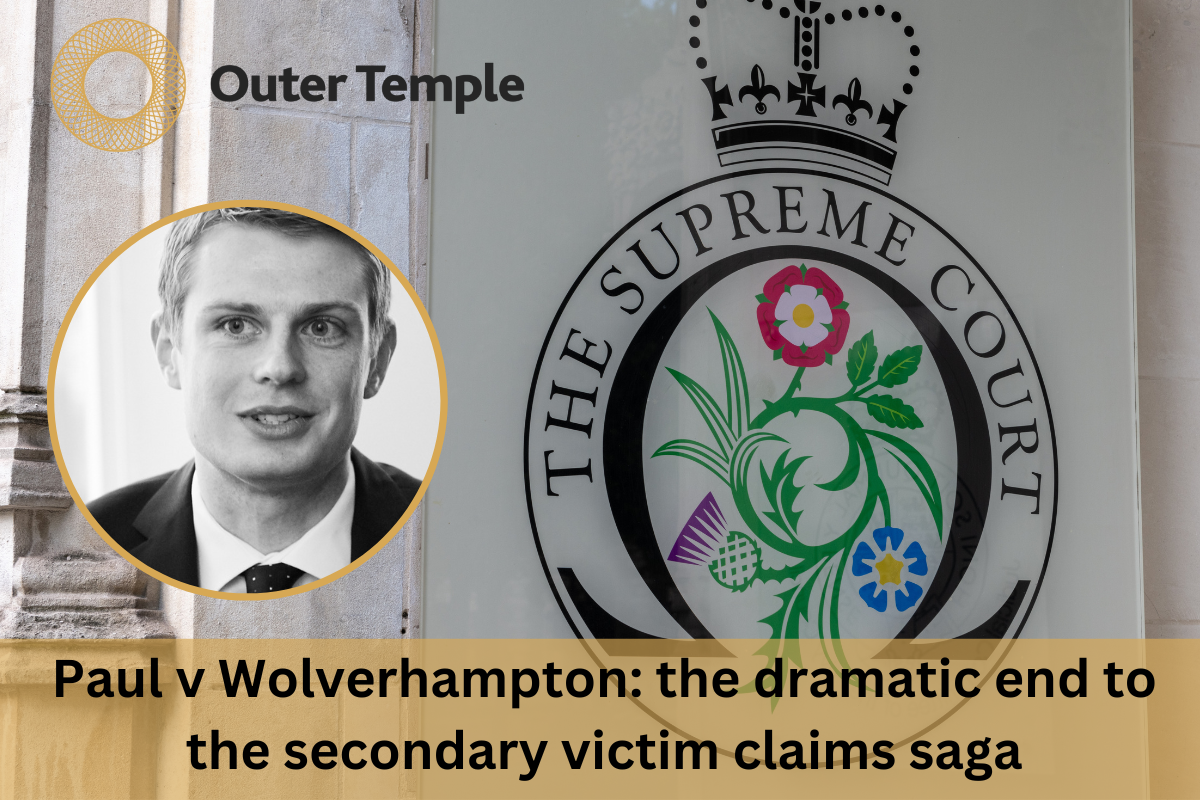
Paul v Wolverhampton: the dramatic end to the secondary victim claims saga
Clinical negligence barrister, Tom Gibson, comments on the dramatic end to the secondary victim claims saga.
The Supreme Court has now handed down judgment on three conjoined appeals on the ‘secondary victim’ criteria for psychiatric injury claims in a clinical negligence setting; Paul v Wolverhampton, Polmear v Cornwall and Purchase v Dr Ahmed.
The judgment [2024] UKSC 1 brings the secondary victim claims saga to a dramatic end.
The Supreme Court dismissed the Claimants’ three appeals by a 6-1 majority. The judgments (running to 256 paragraphs over 76 pages) are complicated. However, as a very brief summary:
- There is a crucial difference between ‘accident’ cases and ‘medical crisis’ cases:
- The three previous key House of Lords authorities – McLoughlin v Brian, Alcock v Chief Constable of South Yorkshire Police, and White v Chief Constable of South Yorkshire Police were all accident cases. And “an accident is, by definition, a discrete event in the ordinary sense of that word, meaning something which happens at a particular time, at a particular place, in a particular way” [paragraph 108].
- Accident cases are different from ‘medical crisis’ cases [paragraph 53], where “the claimant’s injury is caused by witnessing the death or injury of a close relative, not in an accident, but from a medical condition which the defendant has negligently failed to diagnose and treat.” [paragraph 5].
- There is no legal liability for the “category of cases in which illness is sustained by a secondary victim as a result of witnessing a death or manifestation of injury which is not caused by an external, traumatic event in the nature of an accident but is the result of a pre-existing injury or disease” [paragraph 142].
- In other words, “witnessing a negligently caused medical crisis (or its aftermath)” cannot found a secondary victim claim – as opposed to a claim “where the triggering event is an accident” [paragraph 53]. Therefore all three appeals were dismissed.
- The Supreme Court’s conclusion was “reinforced by our opinion that the persons whom doctors ought reasonably to have in contemplation when directing their minds to the care of a patient do not include members of the patient’s close family who might be psychologically affected by witnessing the effects of a disease which the doctor ought to have diagnosed and treated. Hence there does not exist the proximity in the relationship between the parties necessary to give rise to a duty of care” [paragraph 142].
As a result, over 20 years of legal history in medical negligence claims – including Walters v North Glamorgan, which “was wrongly decided on its facts and should not be followed” [paragraph 121] – has been swept away.
It will therefore be extremely difficult to run any secondary victim psychiatric injury claims in a medical negligence context. Nearly all those claims that would have succeeded over the last 20 years, following Walters, will no longer exist in future.
However, the door has not slammed shut on claimants completely. The Supreme Court left open the question of “whether the rules governing claims by secondary victims arising from accidents could ever apply in a medical setting”, perhaps in “a scenario where a doctor injects a patient with a wrong dose or a wrong drug, inducing an acute adverse reaction which is witnessed by a close relative”. Those hypothetical examples were “best left to be addressed in a case where they actually arise on the facts” [paragraph 123].
Find out more
Tom Gibson specialises in medical negligence and personal injury claims, including those for psychiatric injury. He appeared for the successful defendant, Dr Ahmed, in the first instance decision in Purchase v Ahmed.
To find out more, contact Paul Barton on +44 (0)20 7427 4907.
News 12 Jan, 2024
